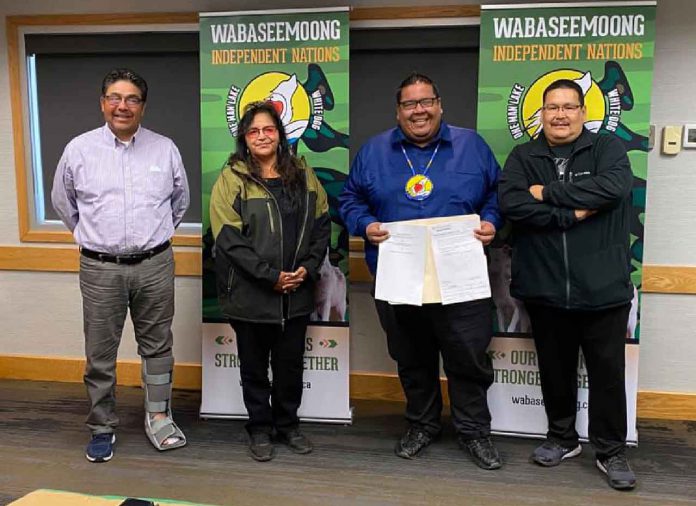Mercury Wellness Centre to be Funded
WABASEEMOONG INDEPENDENT NATIONS, TRADITIONAL OJIBWAY, TREATY #3 TERRITORY – On Friday, Marc Miller, Minister of Indigenous Services, and Wabaseemoong Independent Nations’ (WIN) Chief Waylon Scott signed a Relationship Agreement: Comprehensive Response to Mercury and Human Health in Wabaseemoong Independent Nations.
Chief Waylon Scott, Wabaseemoong Independent Nations said, “We at Wabaseemoong Independent Nations are excited to be participating in this signing agreement today. The health and well-being of our community has always been and will continue to be a top priority for us. In order to make progress forward in addressing these health concerns we have to have a strong relationship built on trust and mutual respect, and we are happy with the steps the federal government is taking today. We will continue to advocate for the wellbeing of our community members, and are pleased to finally see this much needed Wellness Centre developed here that is inclusive for all our members.”
Under the Relationship Agreement, Canada intends to provide up to $19.5 million to support the design and construction of a Mercury Wellness Centre in the community.
Under the Relationship Agreement, Indigenous Services Canada (ISC) and WIN will work together to address the unique health needs of all WIN residents, supporting those living with the effects of mercury exposure, and to develop health systems that recognize the unique challenges faced by community residents.
The Community Health Assessment, which is currently underway, will identify the specific health needs of community members and provide a path forward to address and support these needs.
Strong relationships with First Nations are crucial in addressing the long-standing health issues that have impacted the well-being of their people. Canada is committed to supporting First Nations as they lead the development of unique solutions to close existing gaps in healthcare and meet the health needs of their members.
Quick facts
- Mercury contamination in the English-Wabigoon River system, discovered in 1970, caused exposure among people residing in WIN. Many community members were exposed to methylmercury in the late 1960s and 1970s resulting in the negotiation and signing of a Memorandum of Agreement in November 1985. This agreement was supported by passage of the federal Grassy Narrows and Islington Indian Bands Mercury Pollution Claims Settlement Act, in 1986, and the Ontario English and Wabigoon River Systems Mercury Contamination Settlement Agreement Act, 1986. These Acts provided for the establishment of a Mercury Disability Fund and a Mercury Disability Board to oversee the administration of the trust fund for benefits paid to claimants showing symptoms of past mercury exposure.
- Federal and Ontario provincial governments, together with two pulp and paper mill companies (Reed Limited and Great Lakes Forest Products Ltd), paid a total of $16.67 million in a one-time compensation payment to WIN and Asubpeeschoseewagong Netum Anishinabek.
- WIN is currently conducting a Community Health Assessment, expected to be completed in 2022, that will identify the health needs of community members, including infrastructure, in the form of a Mercury Wellness Centre, programs and services. This assessment will guide the development of a distinctions-based comprehensive health service delivery plan.






